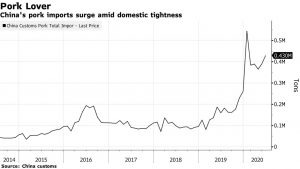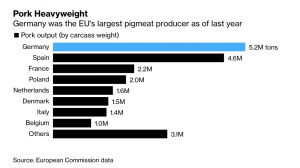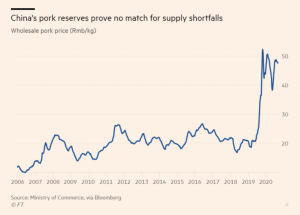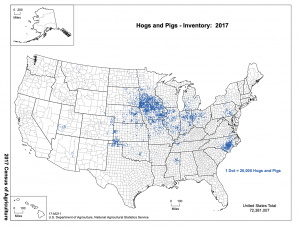A prolonged military conflict in the Middle East could potentially upend key commodity markets due to Iran’s control of the Strait of Hormuz, one of the world’s most important trade…
China’s Ban of German Pork Could Impact U.S. Pork Exports
Bloomberg News reported last week that, “China’s ban on German pork is set to cement the U.S. as the top overseas supplier of the nation’s staple meat.
“An outbreak of African swine fever in Germany — the same virus that’s slashed China’s hog herds and lifted its import requirements — has led Beijing to halt pork purchases and destroy existing supplies from Europe’s biggest producer. That could cut imports by about 300,000 tons this year, said Wang Zuli, an adviser to China’s agriculture ministry.
‘The reduction of supplies from Germany will likely be replaced mainly with those from the U.S. and Spain, which would make the two countries the top suppliers this year,’ said Wang, a researcher at the Chinese Academy of Agricultural Sciences.
The Bloomberg article pointed out that, “In just the first seven months of 2020, China imported 2.56 million tons of pork, well above all of last year’s 2 million tons, as its seeks to meet the shortfall caused by the disease. The U.S. is the top origin with almost a fifth of the total, helped by Beijing’s need to boost purchases of American farm goods to meet its phase-one trade deal pledges.”

Also last week, Reuters News reported that, “German pork exports to China more than doubled in the first half of this year, the Federal Statistics Office said on Wednesday, highlighting the likely impact of a ban on pork imports there after Germany confirmed its first case of African swine fever.
“Germany sold 233,300 tonnes of pork to China in the first six months of this year, equivalent to some 26.8% of total exports of the meat. That made China Germany’s biggest export market for hog meat, overtaking Italy, said the Office.”

The Reuters article noted that, “China’s ban on pork imports from Germany due to African swine fever is set to hit German producers and push up global prices as China’s meat supplies tighten. Other pork buyers have also banned imports.”
And on Monday, a separate Reuters News article reported that, “A further seven cases of African swine fever (ASF) have been confirmed in wild boar in the eastern German state of Brandenburg, Germany’s federal agriculture ministry said on Monday.
“The new discoveries bring total confirmed cases to 20 since the first one on Sept. 10. All were found close to the first case and involve wild boar, with no farm animals affected.”
The article added that, “The ministry had warned on Thursday that more cases in wild boar are to be expected as the animals move around in groups and the disease is easily transferable.”
Meanwhile, Financial Times writers Hudson and Emiko Terazono reported this week that, “China has nearly exhausted its reserves of frozen pork, according to new estimates that underscore the supply shortfall in the world’s top protein market two years after the arrival of African swine fever.

“The level of reserves is a state secret in China, the world’s number one producer, consumer and importer of pork. But Enodo Economics, a London-based consultancy focused on China, estimates that reserves fell by about 452,000 tonnes between September 2019 and August this year.
China has less than 100,000 tonnes of pork reserves remaining, says Diana Choyleva, Enodo’s chief economist. ‘At this rate, within two to three months they’ll be out,’ she added.
The FT article indicated that, “The numbers back up comments from the US agricultural attaché in Beijing in a recent livestock report on China, which noted that ‘pork reserves appear to have been mostly depleted by the third quarter of 2020.'”
“The shortage has forced China to import record amounts of the meat this year from top producers including the US, despite President Xi Jinping’s push for greater agricultural self-sufficiency. Pork imports hit 430,000 tonnes in July, more than doubling from a year before,” the FT article said.

Recall that Illinois is a leading pork producing State, ranking in the top five in inventory and cash receipts.





